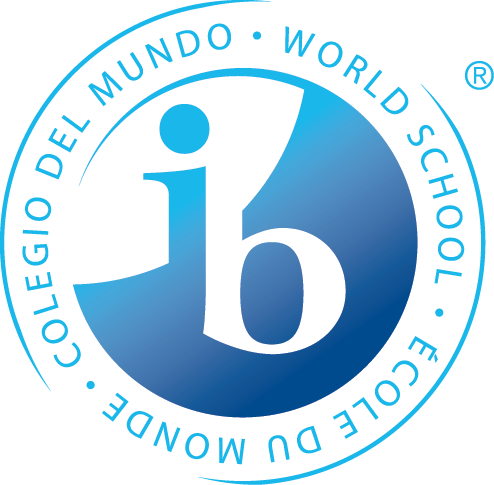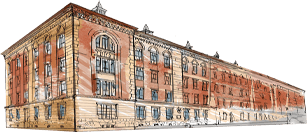2011/2012 school year – September – December
Christmas Party
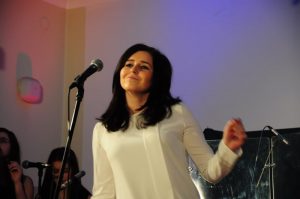 |
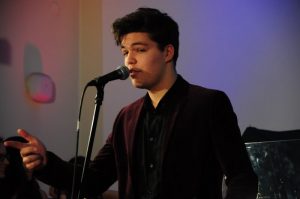 |
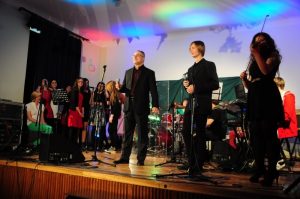 |
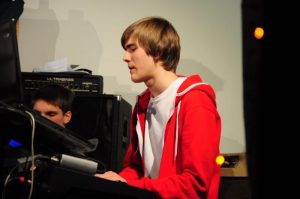 |
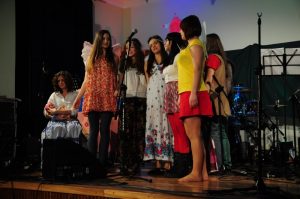 |
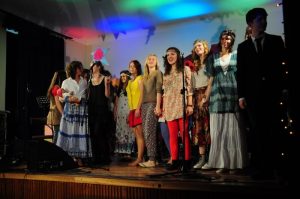 |
December 19, 2011 – School Patron Day
The School Day began at 9.00 with a solemn Holy Mass. in St. Mary’s Church celebrated by Father Robert Piwowarczyk.
After the Holy Mass 6th High School students laid flowers at the Adam Mickiewicz monument.
The ceremony at the Krakow Philharmonic Karol Szymanowski started punctually at 11.00
Director Czesław Wróbel, Ph.D. welcomed all gathered, and then introduced the guests, among others. Aleksander Palczewski of the Małopolska Superintendent of Education, directors of friendly schools. After short speeches, the Director handed the diplomas to the winners of the Mickiewicz Poetry Competition and the scientific session Interdisciplnary Look at the Prophet, as well as the School Director’s Awards to distinguished teachers.
We watched a wonderful performance entitled: Mickiewicz in the trap of love, directed by Mrs. Marlena Maciejewska, performed by students of our High School.
At the end, we listened to a music concert performed by students and graduates of High School No. 6 and invited guests.
We listened to:
1. Isaac Albenitz’s “Asturias” performed by Ewa Góralczyk – piano
2. “Romance” in E minor by Frantz Keyper, performed by Aleksandra Ptak – piano and Michał Bylina – double bass
3. Maciej Wiejaczek’s own composition performed by Aleksandra Ptak – piano, Michał Bylina – double bass and Maciej Wiejaczek – accordion
4. “Amarilla Giulio Caccini (Julio Kachinii) performed by Sara Widera – the guest was accompanied by Mrs. Renata Stec-Fill
5. “Deep Moon” by Antonin Dworzak performed by Katarzyna Wójcik – accompanied by Mrs. Renata Stec-Fill.
6. Sara Widera, Katarzyna Wójcik and Joanna Wal with the vocal ensemble of the 1st II degree State Music School Bronisław Rutkowski in Kraków under the direction of Ms Joanna Stawarska with a piece from Stanisław Moniuszko’s Straszny Dwór “Spod Igiełek”.
7. My Dream – own composition performed by Mateusz Hrynkiewicz – piano
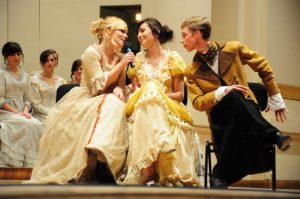 |
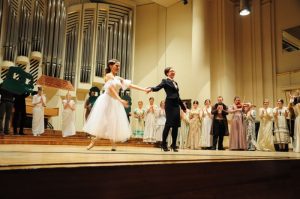 |
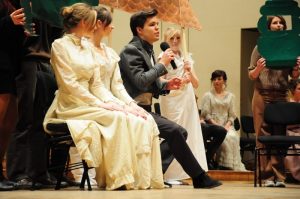 |
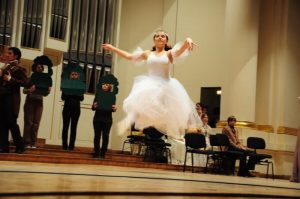 |
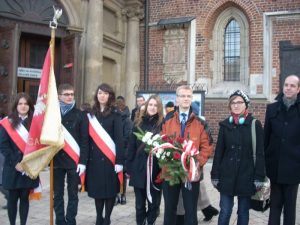 |
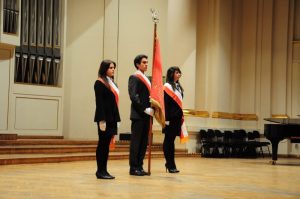 |
Reading Fri “The role of the European Parliament in the modern EU”
On December 20, 2011, Marcin Emilewicz, M.Sc., an employee of the European Parliament, was a guest at the VI Lyceum. “The role of the European Parliament in the modern EU”.
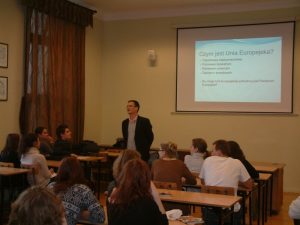
Dawid Błachut is a laureate of the literary competition!
Dawid Błachut from class I E was the laureate of the Kazimierz literary competition – a place on earth, news from poems, streets and alleys.
The competition is organized by the Staromiejskie Centrum Kultury.
Tutor: prof. Iwona Fedan
Opiekun: pani prof. Iwona Fedan
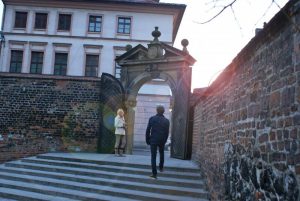 |
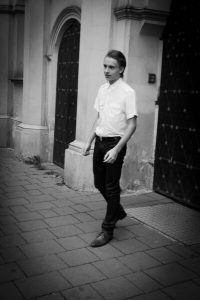 |
Scientific Session: Interdisciplinary look at the Prophet
On December 15, 2011, a session devoted to the life and work of the Patron was organized by the Students’ Self-Government and Ms Marlena Maciejewska at our school.
The speakers prepared and presented the life and work of Mickiewicz from various perspectives: humanistic, mathematical, physical, biological
and chemical and geographic. The session, addressed to second-grade students, was opened by the Director, Dr. Czesław Wróbel.
We heard the following papers:
Winter in Soplicowo – Mikołaj Wilk (student of Polish philology at the Jagiellonian University, graduate)
Mysterious Tale of Nature – Justyna Kiełkowicz (2a)
Adam Mickiewicz. Romantic man of the Renaissance – Konrad Zuchniak (3f),
Help: Bartek Ciotek, Hubert Sotwin (2d)
Preparation: Prof. Aleksandra Włodek
A physical view of the poet’s work – Agnieszka Nowosielecka, Magda Łukawska, Zuzanna Bukowska and Klaudia Czajkowska (1d)
preparation: prof. Stanisława Urbanik- Dec
Mickiewicz under the biological microscope: Animals in “Pan Tadeusz” – Grażyna Ziaja 2b
preparation: prof. Agata Kurek
Adam Mickiewicz’s Travels – Anna Kopta, Artur Kożuch (1d),
preparation: prof. Izabela Klec
Biography of the Prophet – Elżbieta Oprych, A. Pityńska (3h)
Unfortunately, we did not manage to hear the presentation of the students of class 1b: about mushrooms in “Pan Tadeusz” …
Soon we will be able to see the presentation on our website.
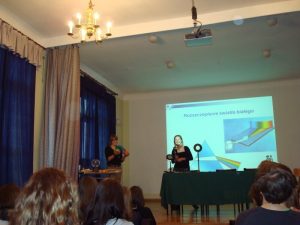 |
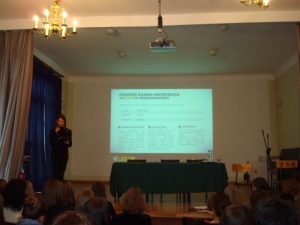 |
Reading Fri “The phenomenon of Egypt against the backdrop of the ancient world”
On December 14, 2011, a lecture on ancient history was held. “The phenomenon of Egypt against the background of the ancient world”. The guest of the 6th High School was Dr. Bartłomiej Konieczny, and his lectures were attended by students of grades IA, IC, IE and high school graduates in history.
Spanish tortilla competition
On December 13, 2011, a competition for the best Spanish tortilla took place in our high school. The dishes were prepared by the students of the Spanish section from class OH. Working in twos, threes or fours, they fried 14 fragrant dishes, which with their original scent lured many students and teachers from the entire school to room 7. We were also honored by the presence of the Lady and the Director. Despite similar recipes and almost identical ingredients, each of the 14 tortillas had its own original flavor and appearance. Everyone, both the preparers and the tasters, were delighted with the course of the competition. In the end, a jury of Iberian ladies announced each of the 14 tortillas as a winner in its own category.
Bartek Janiczak 0h
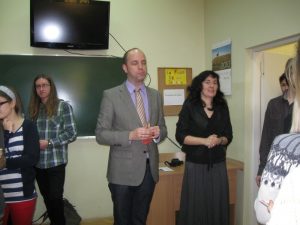 |
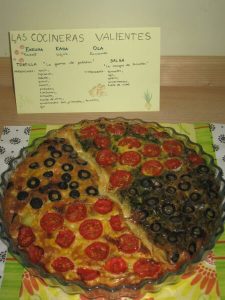 |
Adam Mickiewicz Poetry Competition
On December 13, 2011, as part of the celebrations of the upcoming School Patron Saint, Adam Mickiewicz’s Poetry Competition was organized by the Students’ Council and Polish teachers: Marlena Maciejewska, Iwona Fedan and Teresa Lityńska Konieczny. The meeting with poetry was led by Paulina Doniec (1c). In addition to recitation and sung poetry, we could hear the Invocation in foreign languages: Italian (Mikołaj Dziewoński 3e), Spanish (Katarzyna Parvi 2h), German (Katarzyna Bogucka 3e), French (Amelia Beaumont 2f). Language teachers: P. Jolanta Szczudło, P. Silvia Lopez Garcia, P. Nina Diehl and P. Aneta Wojtaszek helped to prepare this surprise.
The competition was also graced by the performance of the students of class 1f: Ola Miska, Iwona Szczurek, Marzena Rugieł and Błażej Macheta, who presented a fragment of the 10th book of “Pan Tadeusz” – Farewell.
The wonderful recitations and singing of our students were rewarded with thunderous applause. After the stormy deliberations, the jury composed of: prof. Teresa Lityńska Konieczny – chairman, prof. Iwona Fedan, prof. Marlena Maciejewska, Dominika Kuzaj and Mateusz Hrynkiewicz announced the results:
* 1st place in the category of sung poetry: Gaja Raputa (1h) and Hubert Sotwin (2d),
Second Sonnet of Odessa
* 1st place in the recitation category: Klaudia Radwańska (2e), Reduta Ordona
* 2nd place: Dominik Kominiak (3c): Wojski Concert
* 3rd place: Emilia Ponisz (2h): I like it
* distinction: Anna Antonina Kurek (2e), Alpuchara
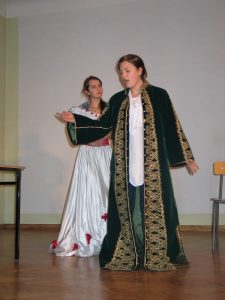 |
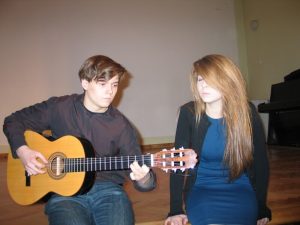 |
NOBLE PACKAGE. GRAND FINAL
Our school took part in the 11th edition of the nationwide program to help the poorest “Szlachetna Paczka”, organized by the Spring Association. All classes participated in the initiative. Thanks to the dedication of the students, their parents and teachers, we managed to collect 89 boxes with food, cleaning agents, clothes, teaching aids and household appliances. We have prepared Christmas packages for 7 families in need. Thank you to all the Donors!
“The packages you have prepared are unique. They’re worth a lot more than the stuff you’ve packed into it. Your heart, commitment and faith in the people you help are a great gift. “
(Rev. Jacek Stryczek, President of the Management Board, WIOSNA Association)
***
November 19. Karolina Gniadek (2b) brings a list of families in need. Enthusiasm! Everyone eagerly wants to join the noble action. Ms. Maciejewska distributes tasks. We start. Full of enthusiasm. All classes expressed their willingness to help. We prepare lists with a description of the families and their needs, we hand out the written products to individual classes. The educators present the idea to the parents at the meeting. The response comes the very next day: the first articles arrive. Temporary warehouses are created in various rooms, and articles are growing. The classes are organizing, shopping, many tutors are very active in the preparations. The second week (last week of the campaign) – the fundraising process continues. Parents and teachers still bring various supplies: there is a washing machine, a frying pan, pots, plates, toys, shoes, a vacuum cleaner, a kettle, a bed, there are even two Christmas trees … It’s impossible to list everything! Emotions are getting bigger! Finally, the checking of the collected items and the packing of parcels begins. Mikołaj Dziewoński (3e) organizes transport for Friday evening. Three days before the finale, it turns out that there is one more family in need. One e-mail with the description of the Family and a list of its needs sent to three classes (1c, 2a, 2e) was enough: immediate response! Most of the articles are on the next day. Two days before the final – great packaging: everywhere you can find students and teachers sneaking past with cardboard boxes, colored papers, tapes, scissors, etc. We take all the cardboard boxes from nearby stores! The parcels arrive. In the afternoon, nerves appear: the search for the lost quilt begins, our Sherlock Holmes, after a stormy investigation, finds her happily on the morning of the next day. The day before the final, there are more packages, they are located everywhere: in room 14, 9, in the teachers’ room, the teacher’s office, even in the cafeteria. Packing continues, often after school, students in all classes are very involved. Teachers are still actively helping. Afternoon – delivery of packages to the school’s main warehouse located on the ground floor. Everything runs smoothly, the classes deliver packages according to the agreed schedule. A special commission checks the cartons, codes them, stacks them and packs them. You are running out of paper and adhesive tape – instant shopping! You still have to buy greeting cards! New gifts are pouring in: here comes Fr. Robert not only with spiritual support, but also with LEGO bricks. Friday. Grand final! From the morning, irreplaceable 1d girls finish packing and describing cardboard boxes. Finally, everything is ready for the evening transport. At 17.30 the father of Mikołaj Dziewoński arrives, we pack the parcels and go to the warehouse at ul. Zamoyski. We appoint Prof. Maciejewska; after minor adventures related to navigation, the pilots’ car reaches the place where Mr. Dziewoński and the boys from 2e have already been waiting. Landing. End. Then a nice conversation over tea and cookies with the Volunteers of the Noble Package. We heard lots of warm words. In addition to the diplomas, we received a cake baked by one of the recipient ladies. We were touched … We left the warehouse feeling a job well done.
Szlachetna Paczka is a great action. It teaches help for those in need, but also responsibility for decisions made. It shows that helping is beautiful, but it requires cooperation and commitment. In addition to material items (so necessary for families), we need heart and time that we spend on others. Szlachetna Paczka is a great adventure and a beautiful lesson of nobility.
Student Council.
***
Szlachetna Paczka is a great undertaking, touching, full of positive emotions, but also requiring great dedication and teamwork. Thank you very much to everyone for the gifts and the time you spent on preparing the packages. I especially thank Aleksandra Wróblewska, Klaudia Radwańska, Małgorzata Hyc, Dominika Mazanek, Kasia Dziewońska, Sebastian Sosin, Konrad Pelczyk, Piotr Kazimierczak, Dawid Kotlarczyk from class 2e, Karolina Gniadek from class 2b, Marlena from class 1f, Magda Bukowska, Zuzia Bukowska, Zuzia , Monika Ścibor, Beata Jurys, Tomek Palonek, Damian Oczkowski, Piotr Łakomski, Artur Kożuch from 1d, Karolina Iwaszkiewicz, Magda Ostrowska, Paulina Doniec, Milena Domagale from 1c, Dominika Kuzaj and Mikołaj Dziewoński from 3e, Tomasz Walczak from 2c. We were all involved in the action, but these people spent several afternoon hours watching over the organization; it is also thanks to them that the parcels were delivered to the main warehouse.
Thanking all the parents of our students, I would like to express my gratitude to Mr. Wiesław Dziewoński (Mikołaj’s father), who on Friday evening (despite his name day) found time to transport the parcels to the warehouse.
I would like to thank all my colleagues for helping: the educators for taking care of the collection of articles, for active participation in the action, and all teachers for material and often spiritual support. The biggest smile of gratitude is directed to Stanisława Urbanik-Dec, P. Bożena Arendt, P. Aleksandra Mach and P. Aleksandra Włodek for great organizational help (as you can see, a humanist cannot do without the help of exact minds).
dr Marlena Maciejewska – the Guardian of the Self-Government
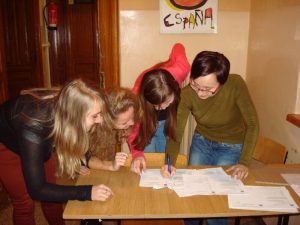 |
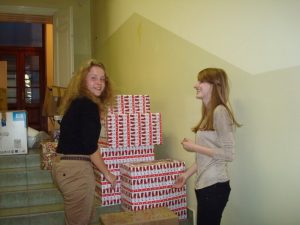 |
Lecture by Dr. Karol Wierzbicki on the issues of transplantology
On December 9, 2011, Dr. Karol Wierzbicki, cardiac surgeon, head of the Transplantology Team at the Department of Vascular Surgery and Transplantology in Krakow, gave a lecture on the issues of organ transplantation.
The lecture was attended by classes 3 B, 3 D, 3H.
Organizer: Agnieszka Kudyba, MA
Charity campaign for homeless animals
In December, the Student Council, on the initiative of Kasia Cudek (2a), joined a charity campaign and collected food, pens, leashes and collars for homeless animals from the Krakow shelter. Thank you all for supporting the action !!!!
“The Phantom of the Opera” and “the vampire in high school” – report from the movie day
“The Phantom of the Opera” and “Vampire in High School”
The film day, which took place on December 8, gathered in the classroom “c” class and other students particularly interested in cinema. Some subject: Vampirism in the cinema marked “the hard way” – they looked interesting and threatening.
It started seriously, with the official opening of the event by the director, Marta Nowak, and with the competition of knowledge about the history and theory of film. Participants said it was difficult. You have to wait a few days for the results.
The film expert, Mr. Iwo Sulka, discussed the realization of the subject by European and American directors (including parodies), reaching even the distant past, up to silent cinema. There was a strange silence in the room during the screening of Dracula F. F. Coppola. Even bats perched on the panes of the windows.
At the end, Teresa Lityńska introduced the cultural sources of vampirism, discussed the topic: From vampire to dhampire.
A few more photos and the party is over.
Successful day, participants happy,
the organizers (Teresa Lityńska – Konieczny and Izabela Żelazna) as well.
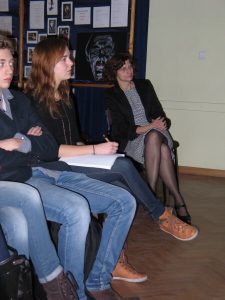 |
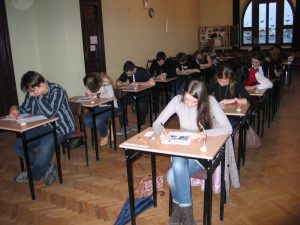 |
Lecture by prof. dr hab. Zdzisław Noga from the Institute of History of the Pedagogical University
On December 8, 2011, prof. dr hab. Zdzisław Noga from the Institute of History of the Pedagogical University, who gave a lecture entitled “The municipal self-government of Krakow in the pre-partition era”. The meeting was attended by class IIE and high school graduates passing history.
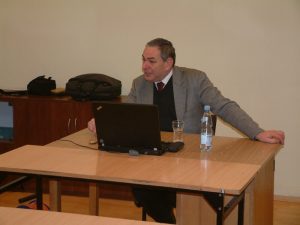
Independence Evening
The Day of Regaining Independence by the Polish nation is the most important secular holiday in our country. They can be handled in any way. The teaching staff and students of Secondary School No. 6 in Krakow decided to celebrate this anniversary in a rather unusual way. Professor Marek Hańderek came out with the initiative to organize an independence evening, i.e. a meeting of everyone interested in the history of regaining independence. He invited musical students of our school to participate in the project. After the first auditions, the final composition and repertoire of poems and musical works crystallized. Before the performance, many long and hard rehearsals were organized until everything was buttoned up to the last button.
The evening event was held on November 28, 2011. About 100 people gathered in the school hall – including several teachers with the Headmaster, dr. Czesław Wróbel at the helm. The fact that the audience could take an active part in the celebration may prove that this event was unusual. Using the projector, the texts of the songs were displayed, as well as images thematically referring to individual pieces, including works by Jan Matejko and Wojciech Kossak. Each song was preceded by a short commentary from the speakers, which informed about its genesis, author or content.
The concert began with the singing of the national anthem. The singing was conducted by a professionally prepared mixed choir. A total of 15 songs and 3 poems were presented. The songs differed in character. Some of them were lively and cheerful, but there were also sad, melancholic and nostalgic songs. All this to show the different faces of the war and the mood of soldiers fighting for an independent Poland. Among the works there are such titles as: “White roses”, “Hey, hey uhlans”, “My first brigade” or “March of Lviv children”. The audience had a lot of fun and it was obvious that they felt great about the atmosphere of the evening. The greatest stir among the audience was caused by “Żurawiejki for cavalry regiments” and the priceless sight was the wide smile of satisfaction that was displayed on Professor Hańderek’s face and Professor Maciejewska’s unbridled attack of laughter.
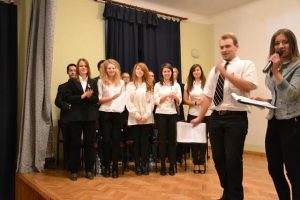 |
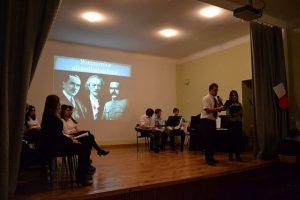 |
Scientific session at the Faculty of Polish Studies of the Jagiellonian University
On December 5, 2011, class 3e and 1c students, together with Dr. Marlena Maciejewska, took part in a scientific session organized by the Department of the History of Polish Literature, Enlightenment and Romanticism and the Krakow Branch of the Literary Society of Adam Mickiewicz: “Thinking with Vincenz. On the fortieth anniversary of the writer’s death”. The papers were delivered by prof. dr hab. Włodzimierz Próchnicki, prof. Dr. Stanisław Stabro and prof. dr hab. Bogusław Dopart. The participants learned about Vincenz ‘biography, the role of Jewish themes in his work and Vincenz’ s reception of Romanticism.
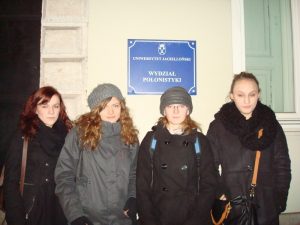
Lecture by Dr. Wojciech Mruk from the Institute of History of the Jagiellonian University
On November 17, 2011, Dr. Wojciech Mruk from the Institute of History of the Jagiellonian University read a lecture entitled “The Beginnings of the Benedictine Order in the Middle Ages”. Classes IA, IC, IE and high school graduates in history took part. There was a discussion after the lecture.
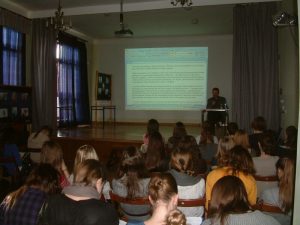
Trip to Lviv
Autumn AD 2011, ul. Dajwór. Some of the classes IIIc and IIIe will start together with prof. Marek Hańderek and prof. Aleksandra Mach for a trip to Lviv. A slight anxiety combined with curiosity and enthusiasm can be felt in the air. Probably not only me asked myself – what will we see there?
We set off on Thursday, October 20 at 21:30. The first major stop on our route was the Polish-Ukrainian border. For inexperienced travelers, never going to Ukraine before, more than 2 hours of waiting at the border seemed to be an eternity, but the kind driver (as we baptized him later) quickly made me realize saying – “it’s not that bad”. As it turned out on his return, he was absolutely right. Returning, however, to the first hours of departure, some of the more smart people took a nap during the stop. As soon as we passed the border posts, there was a forced wake-up call, meaning holes in the roads. Fortunately, a dozen or so minutes later we found a road in fairly good condition, most likely built for Euro 2012. Again, some fell asleep, such as prof. Mach, which I personally admire for such a hard dream. Another wake-up call and finally the desired destination, Lviv. It was a bit disturbing, because the most popular surface in this city is paving, probably remembering the times of Franciszek Józef I. End of whining.
Before leaving, the head hitchhiker of VILO – Marek Dudzik – warned us that one of the few disadvantages of Lviv – apart from the specific public transport in the form of marshrutkas with women of the right size pressed to the limit – is that everyone who comes there will have to return there someday. He was one hundred percent right.
Due to the fact that the trip plan assumed a little over 2 days of sightseeing, we went straight to the city. The first visible sign of Polish culture in Lviv was Mariacki Square with the statue of Adam Mickiewicz. A beautiful, soaring monument, in my opinion, is a hundred times greater than its Krakow counterpart, which I will defend until I drop. Then we went towards the Wuleckie hills, i.e. the place where the Germans in July 1941 they murdered the Lviv intellectual elite. Those whose oversensitive mothers had umbrellas pressed against their suitcases rejoiced in their soul at this fact. Others, including me, counted on the kindness of fellow travelers, as it was falling apart a bit. But the rain was the least important at that moment. I don’t know about the others, but I was a bit overwhelmed by a heavy stone slab with the names of the murdered professors and their families.
The rest of the time on the first day of our stay was spent on visiting beautiful Lviv churches of various rites. As we found out on the spot, Lviv is one of the few cities in the world where Catholics, Orthodox, Armenians and Uniates meet on such a large scale. The very end of the day was spent first searching for something to eat, then browsing the brilliant flea market near the monumental opera house. As for the first case, after considerable perturbations, saving the reader drastic threads, we managed to eat something. The result of this “something” was that many people came to the conclusion that one of the few certainties is a place that I rather try to avoid in Poland, namely McDonald’s. If someone does not believe my words, please ask Mr. Hańder how long he was waiting for the shashlik and what he got on the plate. As for the antiques market, I must admit that it absorbed the most hryvnia, because contrary to appearances, next to the old cones with a hammer and sickle, you could find real white ravens there. Then came the longed-for-night sleep in a hotel for a good price. With the rest of some, e.g. the brave Tomek N., who has not slept for a day, nothing would prevent the desired regeneration of strength. Most of the people gathered in one of the rooms and sang patriotic songs with the accompaniment of Ewa Zygadło playing the guitar. Certainly, the audience remembers my brilliant vocal the most, but I will not develop this topic out of my inherent modesty.
The second day, also a tight time, was largely spent on visiting churches and Orthodox churches. I especially remember the Archcathedral, Uniate Cathedral of St. Jura. On that day, we also saw the monumental Ossolineum and the former Jan Kazimierz University (now the University of Lviv). The Łyczakowski Cemetery, with the graves of many prominent Poles, such as Maria Konopnicka or Seweryn Goszczyński, made a great impression on me (it seems not only on me). Sorrow was caused only by the deplorable condition of many Polish graves. Beautiful monuments, mostly overgrown and damaged, begged for a moment of attention and work. The greatest admiration, however, is the Cemetery of the Lviv Eaglets, where every third grave is buried by a defender of Lviv under the age of 18. The youngest soldiers were 9, 13 and 14 years old. A smile on my face was caused by a good old gentleman – a citizen of Lviv who collected donations in the chapel for the maintenance of this unique necropolis, which, thanks to the efforts of such people, looks splendid.
On the same day, we also entered the Union of Lublin Mound, built on the initiative of Franciszek Smolka on the 300th anniversary of the conclusion of this memorable treaty. Unfortunately, no one mentioned the purpose of this mound on the memorial plaque, but we learn in many languages that general Bohdan Chmielnicki – Krzywonos – was shelling Lwów from this hill. We returned to the hotel after dark. For my part, I did not have much fun, because I almost immediately fell from exhaustion, but I know that, just like the previous day, many people sang and played puns.
On the day of our return, we planned our departure at 1.00 p.m., therefore we spent the morning doing the last shopping and only a glimpse of the Latin Cathedral, where King Jan Kazimierz made his famous vows during the Swedish deluge. In addition, part of the group took part in the Polish-language mass. in the same Department.
Around the aforementioned 1pm, without much delay, everyone was on the bus and we set off. We were saying goodbye to Lviv, very tired. I didn’t know myself that you can see so many places in such a short time. During the trip, prof. Hańderek got his way and showed us a documentary about Nazi and Soviet totalitarianism. Despite concerns that it might be boring, it turned out to be very good and addictive (although the most tired ones would sleep anyway). We also moved ours at the border, wondering what it would be like to cross it during Euro 2012.
On ul. Dajwór was after 9 p.m. – tired, but it seems as fuller as people. We saw something that you simply must see – a large piece of Polish history and the specific diversity of those areas. For my part and on behalf of class III E, I would like to thank prof. Hańderek and Prof. Mach and class III C for organizing this trip – what is important and even surprising – extremely cheaper. Although it was not without some glitches, the trip should be rated as a decent 5+. It was for sure one of the most interesting history lessons I’ve been to. Today I am sure that I will come back to Lviv sooner or later.
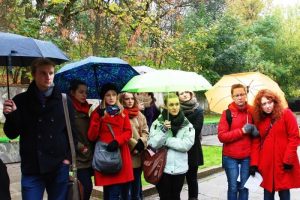 |
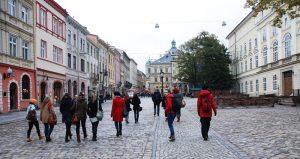 |
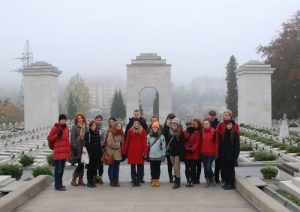 |
Wojciech Karp – klasa 3 E
Artistic gymnastics – congratulations to Ola Brach from class 1D
Artistic gymnastics!
Aleksandra Brach from class 1D in the composition of the Krakow national team, which won the silver medal at the Polish championship of team arrangements. The championship was held in Łódź.
Congratulations to the entire team
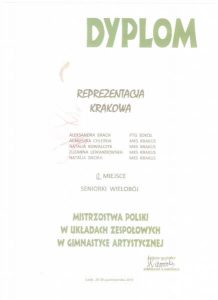 |
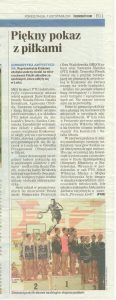 |
Lecture by Dr. Agnieszka Hess from the Jagiellonian University
On November 8, 2011 Dr. Agnieszka Hess from the Jagiellonian University met with grades: IE, IIE and high school graduates who pass history and education. After reading Fri. “1989. Myths and Reality of Polish Transformation” a panel discussion took place.
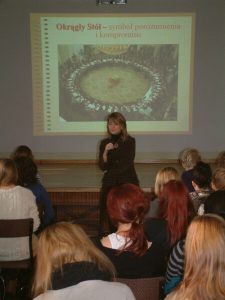
Another series of historical readings has started!
On October 25, 2011, the first historical lecture in the 2011/12 school year with the participation of dr hab. Sławomir Sprawski from the Jagiellonian University. Grades I A, IC, IE and high school graduates passing history listened to a lecture entitled Alkibiades – a white and black legend. A panel discussion took place after the lecture.
Journalism Workshops at Radio Pryzmat
guardian: p. Iwona Fedan
Preparations are underway to record a series of five radio programs dedicated to our school.
More information on the Polish language website, please;)
Science camp 3e
Polish, English, history, knowledge of society in the mountains …
In October, we went to a five-day integration camp in Kościelisko near Zakopane. They were taken care of by brave teachers, prof. Fedan, Płaza and, interchangeably, prof. Hańderek and Sokalski. We spent our days studying, walking and fierce sports games;)
French-Italian Cuisine Day
French-Italian Cuisine Day
October 27, 2011
On October 27, 2011, from 8 am to 11 am, in the auditorium of the VI Secondary School, the French-Italian Cuisine Day was held, in line with the intercultural trends in teaching foreign languages. Young people learning Romance languages took a very active part in the preparation and conduct of this celebration through
- making posters announcing the event and presenting the specialties and curiosities of both French and Italian cuisine, which were placed in the lecture hall of the high school for the duration of the event
decorating and preparing the auditorium, arranging tables
preparing at home the most popular Mediterranean regions and displaying them in the center of the assembly hall
appearance at school in ceremonial attire or attire that reflects the characteristic style of clothing of the inhabitants of France and Italy
presentation of previously personally made dishes and presentation of their preparation: sweet and salty tarts, tiramisu, fondue, onion soup, croissants, bruschetta, olives, cookies with the inscription Ciao and a cake with the Eiffel Tower in the colors of the French flag reigned.
Invited guests: from the French Consulate, vice-consul – Mr. Alain Schneider, Charles Faure representing the Polish-French Friendship Society, and Mrs. Małgorzata Nowak from the Italian Institute, together with Mr. Czesław Wróbel, director, and Mrs. Marta Nowak, deputy director, assessed the dishes during the tasting as the jury.
Three equal prizes were awarded, albums funded by the French Consulate.
The triumph was celebrated: Jakub Sagan’s onion soup (II C), Aleksandra Włodarz’s spinach tart (II C) and one of the tiramisu by Matilda Fanderer
The French-Italian Cuisine Day was not only educational, but allowed young people to discover other aspects of learning foreign languages.
The following educational goals were achieved:
- cultural and linguistic: introducing young people to the most popular dishes of France and Italy, expanding the vocabulary related to the fundamental area of life, which is cuisine, food and meals
- social: organization of own work, gaining the ability to cooperate in a large team composed of known and unknown people, building open, creative attitudes, full of initiative, sensitizing to the effort and work of other peers
- care for respect for school property, participation in supervised work, work in a group of peers, the ability to behave towards guests; representing the school through clothing appropriate to the occasion; preparation and cleaning of the room;
- psychological and pedagogical: presenting the effects of your work to a large audience, controlling stage fright, respecting the work of other peers.
- The invited guests were impressed by the idea and scale of the school event, the involvement of young people and the quality of the dishes made by the young people. On the other hand, the teachers – organizers, delighted with the creative cooperation of young people. We hope that from now on, autumn in Secondary School No. 6 will be associated with Mediterranean cuisine, and this year’s event will turn out to be a springboard for major events related to the culture of French and Italian-speaking countries – Aneta Wojtaszek, M.Sc.
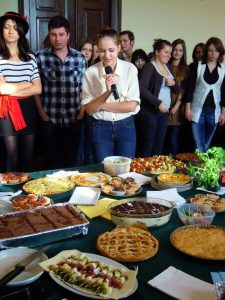 |
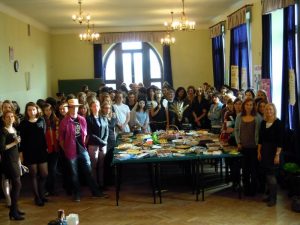 |
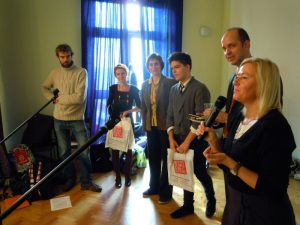 |
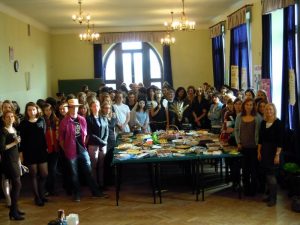
Concert on the occasion of the National Education Day
Our students added splendor to the ceremonial meeting of the Pedagogical Council with a concert arranged by Dominika Kuzaj and Mateusz Hrynkiewicz. We heard well-known, atmospheric songs, although sometimes in a new arrangement. Songs close to the invited guests: both playful and reflective.
The concert featured Dominika Mucha, Kasia Majcherczyk, Ola Pióro, Maciek Nalepa, Asia Szczukiewicz, Ola Smajdor, Magda Łatak, Kinga Świgost, Iga Kryzińska, Magda Daczyńska.
All preparations were supervised by Prof. Marlena Maciejewska
Oath 2011
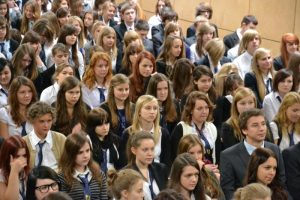 |
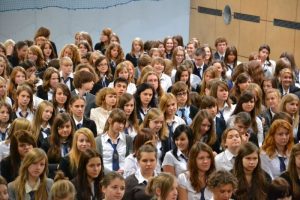 |
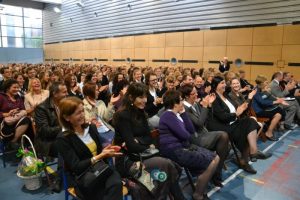 |
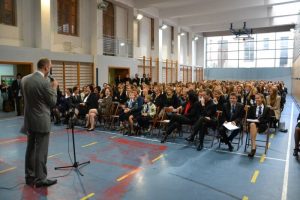 |
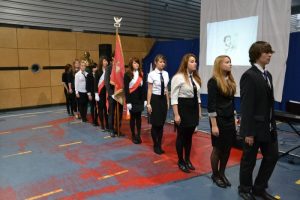 |
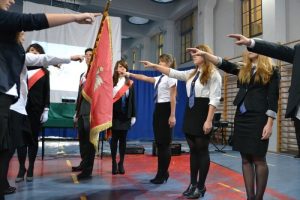 |
Science camp in Hel, October 2011
On September 26 – November 2, class 3b stayed at the research camp in Hel under the care of Mr. Kurek, Mr. Włodarczyk and Mr. Rudnik-Tulej.
During the camp, students participated in classes conducted as part of the Blue School by employees of the University of Gdańsk. They listened to several lectures on the biology and ecology of the Baltic Sea, watched the feeding of seals in the seal sanctuary, studied sea water during a sea voyage, and some fished biological material from the sea with nets. In addition, they visited the Aquarium in Gdynia, took part in theoretical and laboratory classes on the coral reef. In the afternoons and evenings, they took their final exams in biology and chemistry and participated in the evenings: Interview with an element, Ecological fashion show, Chemical and ecological song contest, competed in a chemical-biological quiz. In free time, everyone relaxed on the beach or admired the views from the lighthouse.
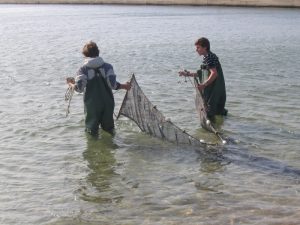 |
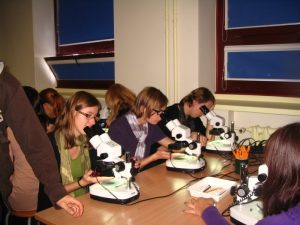 |
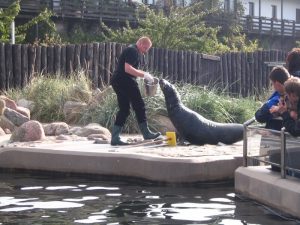 |
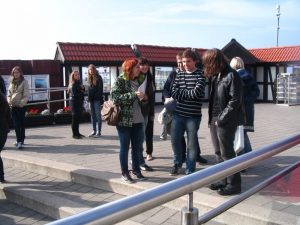 |
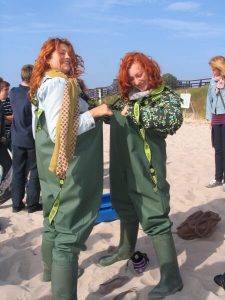 |
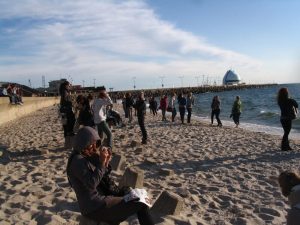 |
Film workshops
Classes 1c, 2c, 3c
Prof. Teresa Lityńska – Konieczny, Prof. Marlena Maciejewska
We are just starting another, fifth season with New Horizons of Film Education. Traditionally, class “c” attend workshops once a month at the Pod Baranami Cinema. In recent years, we have taken part in classes devoted to the history of Polish cinema, the achievements of contemporary cinema, as well as moral and philosophical issues – this year the choice fell on the Film Analysis series. The organizers warn that this cycle is the most difficult, but what is it for us? If we are not yet seasoned recipients of film works, we certainly want to become such. The first classes, based on the work by Andrei Zvyagintsev, The Return, were devoted to the symbol on the screen. A poignant movie! The organizers propose a completely different repertoire than the one to which we are used to. Just look at this year’s set: Mexican, Spanish, German, French, Japanese, Polish … The following titles are ahead: Pan’s Labyrinth, Butterfly and Suit, Gran Torino, Control, Waltz with Bashir, Erratum, Serious Man, Tulpan. All of these are new productions made in the 21st century.
We want to look at culture smarter. Projections, lectures and discussions are to enable us to do this.
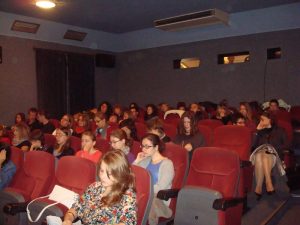 |
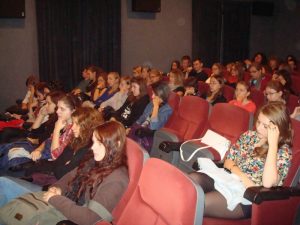 |
The inaugural lecture from WOS is behind us!
On October 12, 2011, the first lecture on knowledge about society was held in the 2011/12 school year. The guest was Dr. Jacek Nowak from the Jagiellonian University. Classes with an extended wos curriculum: IE, IIE and high school graduates listened to a lecture entitled “Social groups and communities”. A panel discussion took place after the lecture.
3h class – research camp in Piwniczna
10-12. October 2011
3h class, research camp in Piwniczna
Prof. Teresa Lityńska – Konieczny, Prof. Agata Jaszczur
“The final exam is ahead of us” – this is the motto of our trip. Admittedly, not very encouraging. J But these are only appearances. It worked out great, to the satisfaction of everyone (read: teachers, students, employees of the holiday center). In Iskra (this is the name of the guesthouse) it is very nice – although it sounds like an advertisement, it is worth taking the risk and announcing to everyone that there is a place in Kosarzyska where they give you a solid meal, have a good rest and learn a bit more. And we learned Polish and mathematics. In the evenings, we watched films – one was supposed to be an incentive to read Ferdydurke. Has it happened? Everyone has to judge the screening himself.
Man does not live by bread alone, I wanted to say, not by science alone … We all understood that, hence the “walk” to the center of Piwniczna, a journey after which we returned exhausted. Quite a long way. We refreshed ourselves with water drunk in the pump room – the cellar is said to have a great effect on the stomach and all other parts of the digestive system. In the evening, we eagerly sat around the fire. On the second day we got to know Stary Sącz – the town square, the convent of Poor Clares founded by Saint Queen Kinga, the papal altar, i.e. the trace of the pilgrimage of John Paul II.
Three very successful days !!!
The victory of our High School in the Złota Ojcowska Jesień rally
On October 7, 2011, high school students took part in the Golden Ojców Autumn rally. It is a rally with a competition organized for the 43rd time. As many as 56 teams showed up at the start!
From our school, representatives from classes Ia, Ib, IIb and IIIb participated in the rally.
The starting point, where the teams collected their starting cards, was under the Bat Cave (maps with the route were distributed). The first checkpoint was located here, where 18 test questions from the nature and history of the OPN were waiting for the participants
and the surrounding area. Students could also visit the Bat Cave. Next, the rally route led along the blue trail through Czajowice, Ciasne Skałki Gorge, Krakowska Gate to the center of Ojców and further to the campsite on Złota Góra.
The second starting point was at the Kraków Gate. At this point, the participants recognized the selected objects from the Ojców National Park on the photo fragments. The third checkpoint was located in the Castle Park, near the Hotel Pod Łokietkiem. Students recognized plant species on the basis of leafy shoots. At this point, you could afford a short break and visit the nature exhibition in the Education and Museum Center and warm up with hot tea in the Educational and Didactic Center. The last checkpoint was at the ruins of the Kazimierz Castle in Ojców. Points were obtained for the correct identification of animal and plant species in the photos (Polish and Latin names should be provided).
The competition ended at the campsite at Złota Góra, where you could bake a sausage or drink hot tea by the fire.
This year, no extra time was needed to decide. The team from our school “Narybek Miętusa” (class 2b: Gosia Tomczyk, Grażyna Ziaja, Kinga Gładysz, Magda Szydło) won the third place with 42 points. Just behind the podium was another team from our school, “Trudus Piliaris” (class IIIb: Sara Mandera, Magda Luberda, Ola Kuras) – this team lost only 0.5 points to the third place, which is why they received consolation prizes.
In the competition of schools, the scoring of the three teams with the best results from each school brought the victory of our school (122.5 points), the second place went to High School No. 8 in Krakow (120.5 points), and the third place No. 2 from Olkusz with a score of 115 points. Awards in the form of diplomas and plush mascots in the team competition were presented by the director of the Ojców National Park, Mr. MSc. Rudolf Suchanek. The winning schools received cups, diplomas and mascots.
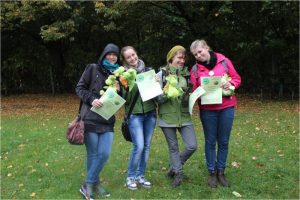 |
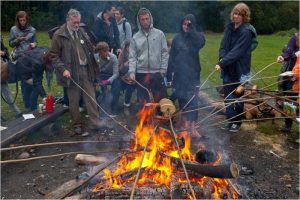 |
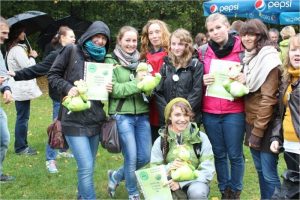 |
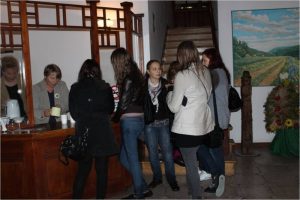
Chemistry and modern society – the international competition EC2E2N

![]()

2011 has been declared the International Year of Chemistry (IYC 2011)
and the Year of Maria Skłodowska-Curie (MCS-100)
and hence our students (current class IIB) took an active part
in the International Competition: Chemistry and Contemporary Society.
Out of the three submitted works, two were positively selected and were included in the works
voted online at the end of the national stage:
We are currently waiting for the results!
Lecture entitled: Culture and nature of India
On the occasion of the International Day of Languages, our school hosted a lecture on “Indian Culture and Nature” in English, delivered by the guest from India, Mr. Uttoran Maiti.
Mr. Uttoran Maiti is a graduate of bilingual schools (with English) in India. Currently, he continues and develops his scientific career in Europe, including in Great Britain and Poland at the Jagiellonian University.
The photo shows students of class IIIA with Mr. Uttoran Maiti.
On October 5 (Wednesday) there was a competition for the first grades
Representatives of all first classes participated in the competition.
The winners were representatives of the IF class who presented a scene from Pan Tadeusz entitled: Farewell.
The IC class was awarded for the film presenting the staging of the ballad Świtezianka, in which students of class I C participated together with the tutor, Prof. Anna Toboła and the Polish language teacher Prof. Marlena Maciejewska. It was directed by Kla



